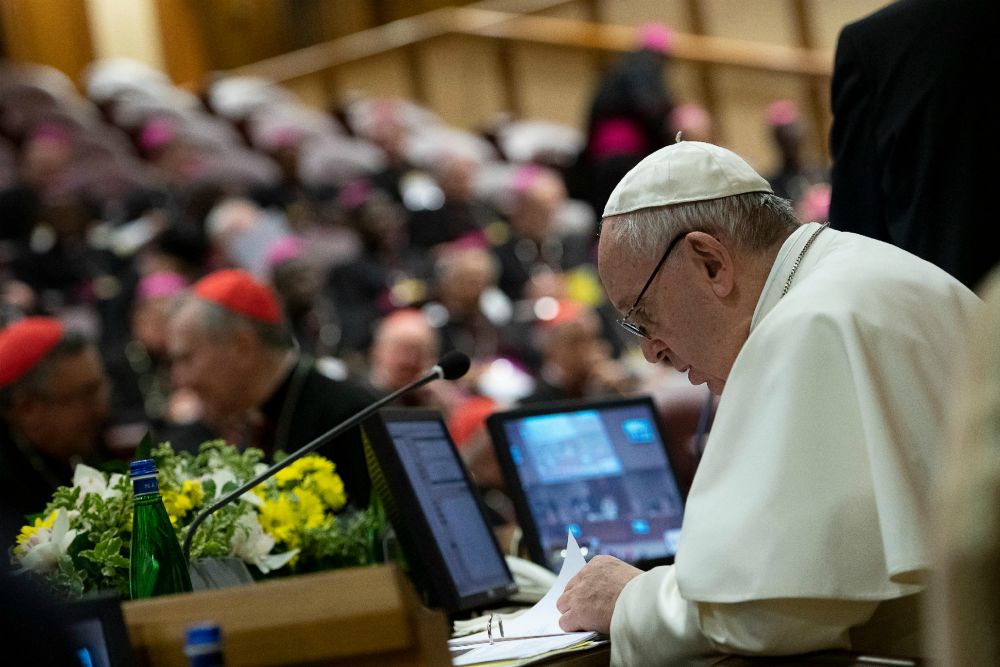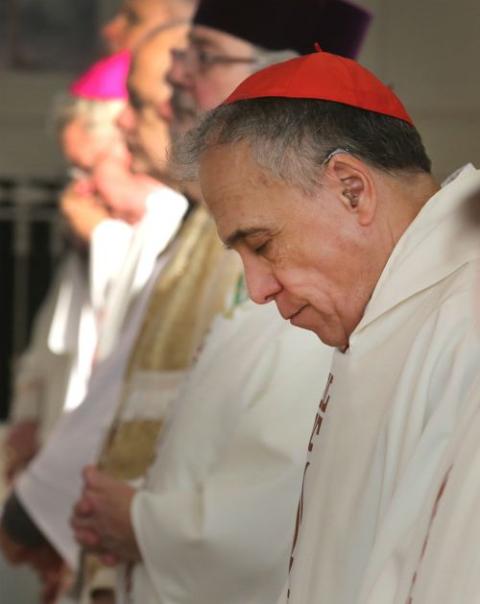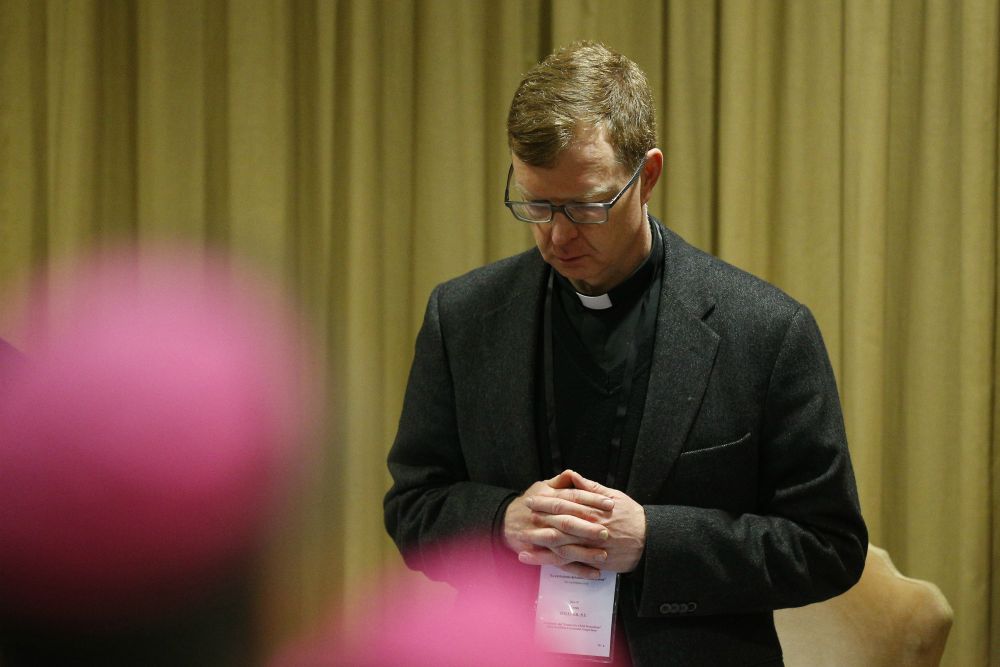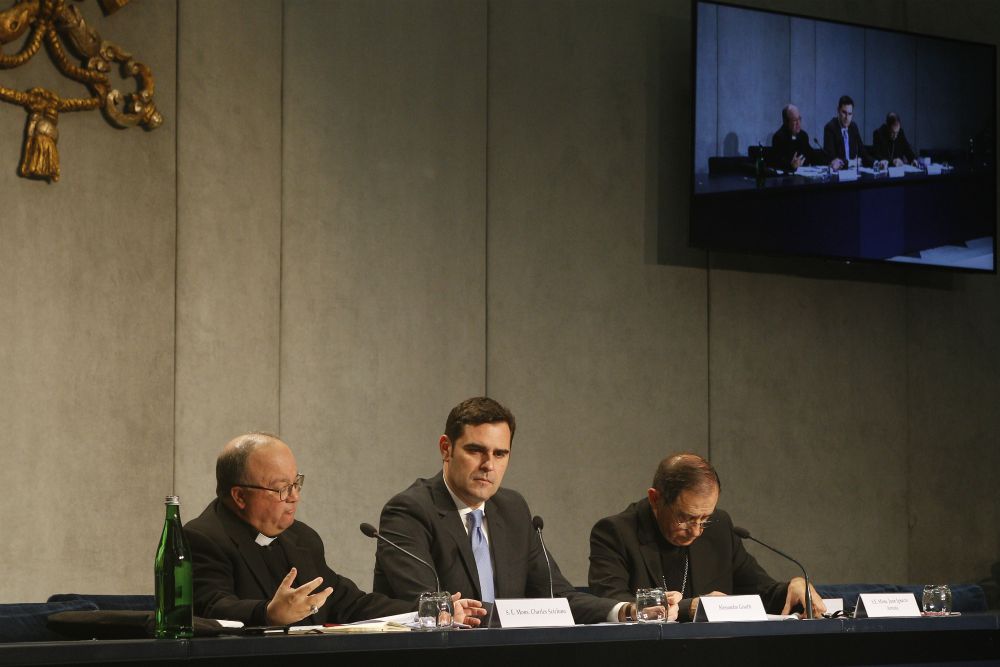
Pope Francis reviews papers during the third-day of a meeting on the protection of minors in the church at the Vatican Feb. 23. (CNS/Vatican Media)
Bishops welcomed it. Clergy abuse survivors said it didn't go far enough. Other Catholics saw it as a necessary, but not final, step.
Those were prevailing initial reactions to new norms issued Thursday by Pope Francis for addressing clergy sexual abuse. While many acknowledged the apostolic letter Vos estis lux mundi ("You are the light of the world") moved the church forward in addressing a scandal that has besieged the church more than three decades, reaching a new peak in the past year, there remained a sense the document was not sufficient alone and failed to address some core causes of the crisis.
"This is an important step forward for Catholics around the globe, particularly for abuse victims/survivors and their families," Kim Smolik, CEO of Leadership Roundtable, said in a statement. "While it does not yet address the breadth of culture change necessary to address the root causes of the crises of abuse and leadership failures, it does provide the foundation for bishop conferences to create meaningful accountability policies for their region."
The apostolic letter from Francis, issued motu proprio (on his own initiative), established new church laws concerning the reporting of sexual abuse and misconduct and how investigations are conducted.
It mandates new procedures requiring all priests and members of religious orders to report allegations of sexual abuse or its cover up to their bishop or superior. It establishes protections for those reporting abuse or cover-up allegations, and blocks attempts to silence accusers from speaking about their accusations. It directs archbishops to oversee investigations of other bishops within their ecclesiastical provinces, and sets a timeline of 90 days for reports to be made to the Vatican for final determination. While it encourages lay involvement in such investigations, it does not obligate it.
The new norms become effective June 1 and direct all dioceses worldwide within a year to establish reporting and investigating procedures. They represent the second set of laws on abuse issued by Francis since he held a first-of-its-kind summit in February, when leaders of episcopal conferences around the world came to the Vatican to address the issue of sexual abuse in the Catholic Church.
In a series of tweets, Newark, New Jersey Cardinal Joseph Tobin said that with the latest measures "Pope Francis reminds us that 'care of persons' must be a bishop's primary consideration" and that he "makes it clear that transparency and accountability are essential to the identify and mission of our Church."
Survivors' perspective
While acknowledging some signs of improvement, abuse survivors and their advocates said the new measures did not go far enough. Specifically, they criticized the document for not creating a universal zero-tolerance policy for child sexual abuse or its cover-up — keeping the investigation process internal and not establishing clear penalties for those failing to report abuse or engaged in its cover-up.
"A lack of policies or procedures has never been the main problem in the clergy sex abuse scandal," the Survivors Network of those Abused by Priests (SNAP) said in a statement. "Rather, it has been a lack of accountability for hierarchs who conceal sex crimes and a deficit of courage and willingness to take immediate, decisive action on those who have enabled those crimes to occur."
Peter Isley, a longtime SNAP leader and founding member of the global group Ending Clergy Abuse, said no zero-tolerance policy was perhaps the most glaring omission.
"Bishops around the world have abusers in ministry or have put them back into ministry even when they are found guilty. There is nothing in this new law that forbids them from continuing to do so," he said in a statement for Ending Clergy Abuse.
Advertisement

Cardinal Daniel N. DiNardo of Galveston-Houston, president of the U.S. Conference of Catholic Bishops, during Mass at Mundelein Seminary at the University of St. Mary of the Lake near Chicago, Illinois, Jan. 3. (CNS/Bob Roller)
On the issue of mandatory reporting, Isley criticized the lack of a universal requirement to bring all cases to local civil authorities. The apostolic letter states that reporting to authorities should be done where such laws exist, but it did not mandate reporting beyond that. Church officials have defended that determination by pointing to the different cultural approaches to handling sexual abuse.
But Isley said if that's the case, the Vatican instead should identify those countries where an exemption from reporting is necessary and then make reporting mandatory for everyone else.
"The church should establish the law for reporting and justify the exception. Instead, they are using the exception as a pretext for not reporting sexual abuse to civil authorities and to keep abuse secret," he said.
Overall, he said the new set of laws "appears to be designed to make no significant or meaningful change in how bishops and the Vatican deal with cases of child sex crimes by priests."
BishopAccountability.org, which has tracked the clergy abuse crisis since the early 2000s, called the apostolic letter "not nearly enough," and pointed to what it deemed "three serious weaknesses": the lack of stated penalties for those who don't adhere to the norms; the lack of mandated transparency to the public; and the lack of a requirement of permanent removal from ministry for abusive clergy.
"This is not the bold action that's desperately needed. A law without penalties is not a law at all — it's a suggestion," the Massachusetts-based organization said in a statement.
While critical of what was missing, the abuse survivors and advocates also acknowledged some progress in the document. SNAP called the mandated reporting of suspicions of abuse or cover-up "a good thing" and also acknowledged protections for whistleblowers, a more expansive definition of vulnerable adults and a pledge by the Vatican to move quickly on internal investigations.
"If enforced, there's no doubt the new motu proprio, Vox Estis Lux Mundi, will improve the church's internal processing of allegations," said BishopAccountability.org, which also highlighted the whistleblower protections and specific procedures for reporting bishop misconduct. "This isn't trivial — it's a step forward."
One part of an overall effort
Fr. Hans Zollner, president of the Center for the Protection of Minors at the Gregorian University in Rome, also characterized the new rules as "a very important step forward" in comments made to the London-based Catholic weekly The Tablet.
"It is not the end of the journey, but this is a huge improvement," he told The Tablet. "It addresses a number of issues that have been lingering around for many years."
Kim Daniels, associate director of the Initiative on Catholic Social Thought and Public Life at Georgetown University, expressed similar sentiments, saying on Twitter, "This is just one step in a long, well-overdue effort, and much more remains to be done.
"But it is that: a strong step forward for the global Church, and another concrete result of the February 2019 Meeting on the Protection of Minors in the Church," she said.

Jesuit Fr. Hans Zollner, president of the Centre for Child Protection at the Pontifical Gregorian University in Rome, prays at the start of the third day of the meeting on the protection of minors in the church at the Vatican Feb. 23. (CNS/Paul Haring)
Boston Cardinal Sean O'Malley, who chairs the papal commission on clergy sexual abuse of minors, called the new norms "one means of fulfilling" the pope's pledge of "concrete measures" made at the end of the February summit.
He also cited the importance that the provisions require alleged victims be informed about investigations and the expanded definition of "vulnerable persons." He added it was significant the apostolic letter "includes adults who suffer sexual offenses through violence or intimidation or the abuse of authority."
"During the past year it has become far more clear that the people of the Church and our wider society rightfully demand substantive action for disclosure, transparency and accountability with regard to any occurrence of sexual abuse, or intimidation, or cover up in the life of the Church and that that all Church personnel, regardless of office, be subject to the same policies, procedures and sanctions. Vos estis lux mundi is an important and substantive response to that demand," the Boston cardinal said.
The Vatican abuse summit came three months after the U.S. bishops pressed pause, at the direction of the Holy See, on their own efforts to develop new policies and procedures on clergy abuse, in particular abuse or misconduct by bishops in light of revelations in the past year of child abuse and inappropriate relations with seminarians by now ex-cardinal Theodore McCarrick. In February, the former Washington D.C. archbishop was removed from the priesthood.
The McCarrick case, along with a flood of disclosures of credibly accused priests and attorneys general investigations, spurred by a grand jury report in Pennsylvania, has shaken the faith of wide cross-section of Catholics, with much anger directed toward inaction and cover-up by bishops. A March Gallup poll found 37 percent of U.S. Catholics saying the scandals have led them to question if they should remain in the church.
"This is not the bold action that's desperately needed. A law without penalties is not a law at all — it's a suggestion."
— Bishop-Accountability.org
Cardinal Daniel DiNardo, president of the U.S. Conference of Catholic Bishops, said in a statement Thursday that the apostolic letter will hold bishops accountable not only for the sexual abuse of minors or vulnerable adults but for "any coverup of such crimes."
"The Motu Proprio shows Pope Francis expects swift and comprehensive progress," said Dinardo, the archbishop of the Galveston-Houston Archdiocese. "For the Church in the United States, the task before us now is to establish whatever is necessary to ensure the effective implementation of the Motu Proprio."
The U.S. bishops' conference president added that conference committees have already begun preparing implementation measures that will be discussed at their June meeting in Baltimore.
Chicago Cardinal Blase Cupich, one of the leading proponents of the metropolitan model for investigating allegations against bishops, said the papal document "provides a framework" for U.S. bishops at their annual spring gathering to adopt measures "that will both implement the pope's executive order and address the issue of holding everyone in the Church accountable."
'A major breakthrough'
The Leadership Roundtable, which promotes best church management through a network of laity, religious and clergy, said it welcomed the opportunity to work with bishops and other church leaders "to create a new culture of leadership and management so that the root causes of the crises may be addressed for the long-term health and mission of the Church."
Days after the close of the Vatican abuse summit, the Washington D.C.-based organization issued its own recommendations for addressing the sexual abuse scandal and related leadership failings. While the new laws from the pope do not address all the issues it outlined, the Leadership Roundtable said it "goes further than any previous Church laws in its scope of accountability and its global reach."
Sr. Carmen Sammut, outgoing president of the International Union of Superiors General and one of the Catholic sisters who took part in the Vatican abuse summit, told NCR she had not yet had a chance to closely study the new rules, and was uncertain what they might mean for women religious abused by clergy. Still, the superior general of the Missionary Sisters of Our Lady of Africa viewed the adoption of the metropolitan model as a positive, as well as the indication that reported allegations must be taken seriously.
"[The letter] puts more responsibility on everybody in the sense that we should be very much aware of what is happening and then have the courage to do something about it," she told NCR.

Archbishop Charles Scicluna of Malta and Bishop Juan Ignacio Arrieta, secretary of the Pontifical Council for Legislative Texts, together with Alessandro Gisotti of the Vatican press office, present Pope Francis' new document on abuse norms, "Vos estis lux mundi" at the Vatican May 9. (CNS/Robert Duncan)
In India, where Catholics have been reeling from the arrest of a bishop for allegedly raping a nun, the papal abuse directives were received with hesitance. Chhotebhai (a name meaning "little brother"), convener of Indian Catholic Forum, a national body of lay people, said while Catholics worldwide should welcome the apostolic letter, he worried it may not be strictly implemented unless it becomes amended into canon law.
"If not, it will remain a pious exhortation, and will remain open to interpretation and possible non-implementation," he said.
The Leadership Conference of Women Religious in the U.S. said it was "pleased" to see the pope put forward concrete actions on reporting abuse and cover-up, and that it plans to study the document further.
FutureChurch called the letter "an enormous step forward in addressing the crisis of clergy sex abuse and its coverup that has been crippling the church for decades" and moves it toward a new era of accountability. But they too saw room for more, especially in including lay people in the process.
"While we are pleased with the direction of this motu proprio, it does not go far enough in strengthening the accountability structure,” FutureChurch co-director Deborah Rose-Milavec said in a statement. "These new norms continue to rely on the same clerics who covered up crimes against children; fails to incorporate lay persons in every aspect of oversight; and does not mandate those with authority to report crimes to civil authorities."
Anchorage, Alaska Archbishop Paul Etienne, who was recently named coadjutor to the Seattle Archdiocese, wrote on his blog that he was pleased by the speed and specificity of the norms.
"Today's Motu Proprio sends a clear message to the world, especially the members of the Church, that no matter one's office in the Church, everyone will be held accountable for any misconduct with minors or vulnerable adults, as well as for the manner in which the Church (bishops especially) responds to victims," Etienne wrote.
New York Cardinal Timothy Dolan said the pope's apostolic letter "once again displays his deep pastoral concern that the evil scourge of sexual abuse must be dealt with swiftly and seriously and shows that he has listened intently to the voices of his people around the world."
"In short, Vos estis lux mundi is another sign of the Holy Father's desire to institute reform, promote healing, and insure justice," Dolan said in a statement. "It is a much-needed and tremendously important step forward for the Church universal."
John Gehring, Catholic program director for Faith in Public Life, struck an optimistic chord, calling the new measures "a major breakthrough" in getting a global institution on the same page.
"Making sure an ocean liner as big as the Catholic Church is steering in the same direction to confront clergy abuse is a significant win," he wrote on Twitter. "Despite a small but vocal movement to undermine his papacy, Pope Francis is taking decisive action and staying the course."
[Brian Roewe is an NCR staff writer. His email address is broewe@ncronline.org. Follow him on Twitter @BrianRoewe. Global Sisters Report editor Gail DeGeorge contributed to this report from Rome. Jose Kavi reported from India.]








